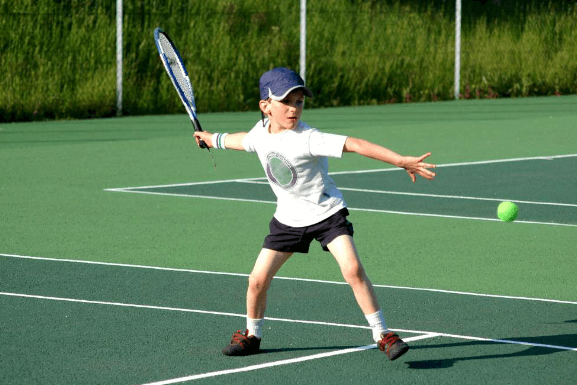Sports’ impact on children’s development is well-documented and analyzed by educators, psychologists, and sportspeople. Tennis has distinct benefits for childhood development beyond physical conditioning. Children who start playing this sport early benefit most from cognitive enhancement. Tennis engages the mind and body, improving mental acuity, problem-solving, and attention.
Cognitive Development Through Strategic Play
Foresight and precision are needed to make each move in tennis, which is sometimes compared to chess. Children learning tennis must think critically about their play style, anticipate their opponent’s moves, and make quick decisions. Tennis’ strategic aspect develops planning, tactical, and spatial awareness.
Children continually analyze the court when playing tennis. Based on their location, their opponent’s position, and their speed and spin, they must decide where to hit the ball. This frequent analysis improves their analytical thinking. Strategic thinking can increase academic achievement in problem-solving and analytical courses like math and science over time.
Improved Focus
Tennis’ quick tempo takes intense concentration. Learning to watch the ball and understand the game’s dynamics helps improve a child’s attention span. This is especially useful in the digital age, when kids are constantly distracted. Regular tennis practice can help kids develop sustained attention, which is essential for academic and personal success.
Tennis’ repetitious rallies and tactical changes help kids focus. Each tennis point is different, so players must focus quickly. Children’s capacity to quickly switch attention and shut out distractions helps them focus in class and on exams.
Problem-solving, adaptability
Children can also improve their problem-solving skills through tennis. Players must solve new puzzles each match, frequently under physical and psychological pressure. Through trial and error, children learn to detect patterns, modify their techniques to their opponent’s play style, and overcome obstacles. This problem-solving experience applies to academic and real-world circumstances where adaptation and quick thinking are essential.
Tennis players must also modify their plans dependent on their opponents, their own performance, and environmental factors like weather. Learning to adapt and deal with instant changes enhances a child’s resilience and capacity to handle everyday life’s ups and downs.
Establishing Lifelong Learning
Tennis also fosters a growth mindset. When kids evaluate their performance and identify opportunities for development, they build a growth attitude. Instead than assuming that talent determines achievement, they learn that abilities can be developed through hard work. This attitude promotes lifelong learning and intellectual and personal progress.
Tennis gives kids more than just physical activity—it helps them develop cognitively. Tennis teaches children strategic thinking, prolonged concentration, quick decision-making, and adaptability for success off the court. As youngsters grow and play the sport, their cognitive benefits provide the groundwork for their academic and personal success.
Developing Emotional and Social Skills
Tennis helps kids develop emotional intelligence and social skills as well as physical and cognitive talents. These skills help a child negotiate complex social contexts, sympathize with others, and manage their emotions—as important as intellectual aptitude for success and well-being.
Develop self-regulation and emotional control
Tennis teaches emotional self-regulation. Tennis players generally play alone, so young sportsmen must learn to handle pressure. Children learn to stay calm when facing a missed shot or a winning streak. This emotional control exercise helps youngsters manage their emotions in times of success and hardship, building resilience and stress management.
The sport naturally encourages players to put aside their emotions and focus on the next point. Children’s capacity to reset emotionally and mentally after every tennis game and set helps them handle disappointments and disputes in daily life.
Socialization and Teamwork
Tennis is an individual sport, but doubles play offers plenty of socialization and teamwork. Effective communication, strategy sharing, and partner support improve children’s cooperation and social skills. Children must negotiate, collaborate, and lead or follow in these interactions, which are essential to social competence.
In addition to doubles, tennis training encourages social development. Clubs and teams expose kids to coaches, peers, and opponents, requiring them to be polite and respectful. Regular connection with diverse people helps youngsters comprehend social dynamics and adjust to different social circumstances.
Perspective-taking, empathy
Tennis helps kids learn empathy and perspective. They learn to anticipate and comprehend their opponents’ emotions during bouts. Reading emotional cues is essential for building empathy since it requires evaluating the opponent’s mental and emotional state during play. Personal connections and future careers require such skills, which are equally useful on the court.
Tennis also teaches kids how to adapt to diverse coaching approaches and player personalities. This exposure to many ideas helps them cultivate empathy and inclusion in relationships, improving their ability to connect with others.
Tennis helps young players develop emotional and social abilities in various ways. This sport gives kids physical, cognitive, emotional, and social skills that help them grow up well. These skills are essential as they negotiate interpersonal and societal challenges throughout their lifetimes.





 Fostering Academic Excellence Through Sports: The Role of Physical Activity in Enhancing Cognitive Function
Fostering Academic Excellence Through Sports: The Role of Physical Activity in Enhancing Cognitive Function